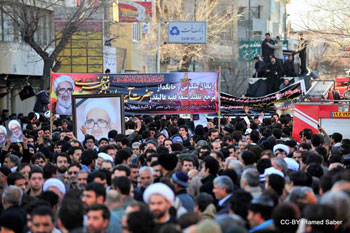march for democratic rights
 |
| Funeral procession for Grand Ayatollah Hossein Ali Montazeri in Qom, Iran, December 21, turned into giant march for expanded political rights. Montazeri spoke out for freeing political prisoners and ending censorship, and was part of bourgeois opposition to current Iranian government. Amid mass protests for democratic rights, workers have increasingly pressed for relief from economic crisis with demands for jobs, higher wages, and back pay. |
BY CINDY JAQUITH
Demonstrations in Iran—some of the largest yet for democratic rights since the summer—erupted in late December. They showed that the government remains incapable of halting those demanding political freedoms.
Crowds estimated at hundreds of thousands poured into Qom, the religious capital of Iran, December 21 for the funeral of Grand Ayatollah Hossein Ali Montazeri, who died at the age of 87.
Montazeri had denounced the results of the June 12 presidential elections as fraudulent and said “no one in their right mind” could believe that President Mahmoud Ahmadinejad had won 2-1 against the leading contender, former prime minister Mir Hossein Mousavi.
Montazeri was designated in 1984 to succeed Ayatollah Ruhollah Khomeini as the Supreme Leader of Iran, the most powerful position in the country. In 1988 he criticized the executions of several thousand political prisoners and Khomeini removed him as his successor. In 1997 Montazeri was put under house arrest for six years after he said that Ayatollah Ali Khamenei, who became supreme leader upon Khomeini’s death, was not qualified for the job.
Several senior ayatollahs in Iran, including Khamenei’s brother Hadi, joined the funeral procession, a sign of how deeply the clergy and the ruling layers of the country are divided over how to respond to mounting demands for jobs, higher wages and back pay, political rights, women’s rights, and the rights of Iran’s many oppressed nationalities.
Workers from Iran Telecommunication Industries demonstrated December 22 outside a speech by Iranian president Ahmadinejad in Shiraz. The semiofficial Mehr News carried photos, including one of a banner saying, “For 11 months we have not been paid.”
The government banned further mourning ceremonies for Montazeri after the huge turnout in Qom. But marchers in several cities defied the order.
The protests reached a climax on December 27. That is the date of Ashura, an important day of mourning in Shiite Islam. Crowds of tens of thousands to hundreds of thousands marched that day in Tehran and other cities shouting “Death to the dictator!” Security forces opened fire, killing at least eight, including Mousavi’s nephew.
Some troops refused to carry out orders to attack fellow Iranians, the opposition Web site Rahe Sabz reported. It cited one case of a soldier being slapped by his officer and threatened with court martial.
Demonstrations also erupted in Isfahan and Najafabad in central Iran, Mashhad in the far east, Shiraz in the south, Arak in the west, and Babol on the Caspian Sea. Azerbaijanis, an oppressed nationality in the northwest, took to the streets in Zanjan and Tabriz. Rahe Sabz said four protesters were reportedly killed in Tabriz.
Gov’t holds counterdemonstration
Ahmadinejad responded by accusing the governments of the United States and Israel of orchestrating the protests. The government organized marches in Tehran and other cities December 29 to denounce the opposition’s “desecration” of Ashura. Encouraged by free transportation and a day off for public employees, hundreds of thousands turned out. Some demonstrators demanded that Mousavi be executed.
Mousavi responded to the threats January 1 in a statement published on opposition Web sites. “We are neither Britons nor Americans,” he said. “Assuming you impose silence through arrests, violence, threats and muzzling newspapers and websites, how can you remedy the people’s changed attitude toward the regime? How can you address its lack of legitimacy?” He called for the release of political prisoners, a free press, and the right to peacefully demonstrate.
In a letter to Ayatollah Khamenei that same day, Mohsen Rezaie, a conservative politician who also ran in the June 12 presidential elections, urged him to consider what Mousavi had proposed. Rezaie said the statement was positive and could “signal the beginning of a new unifying movement.” Mousavi, he said, “retreated from the position of denying the legitimacy of Mr. Ahmadinejad’s government” and made “a constructive proposal about the role the parliament and the judiciary must play in holding the administration accountable.”
Although an estimated 1,500 have been arrested, the government is deeply divided over how to deal with the opposition. The deputy national police chief, Ahmadreza Radan, announced December 30 that the arrest of top opposition figures “is not on the agenda,” according to Mehr News. He said if protest leaders are arrested they will become heroes.
Amidst the fight for democratic rights in Iran, the Obama administration is focused on what it sees as an opportunity to press harder for new sanctions to block Iran’s nuclear program.
The New York Times reported January 3 that unnamed Obama advisers believe “domestic unrest and signs of unexpected trouble in Tehran’s nuclear program make its leaders particularly vulnerable to strong and immediate new sanctions.”

No comments:
Post a Comment
Comments